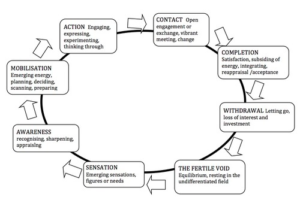The ‘Cycle of Experience’ is perhaps the core idea that Gestalt Therapy has contributed to our understanding of the human condition. It explains how more or less consciously we all have needs, concerns and intentions moment by moment in our lives. The idea is that we recognise and pursue these needs, concerns and intentions (more or less effectively) until they have been dealt with and something else pops up to direct our thoughts and behaviour.
The cycle can be represented like this:

This cycle of needs arising, being addressed and falling away – the process of Gestalt formation and destruction – is seen as characteristic of healthy functioning. OD practitioners have increasingly recognised that the cycle has useful applications for working with teams, departments and whole organisations to enable them to function more effectively.
The fit, though, isn’t always perfect and sometimes is hard to recognise. So in a Gestalt in OD discussion group on Linked In the question was put by Marianne Chidiac – “How often do we encourage our clients to do nothing? Or even take that advice ourselves?” linking the idea of doing nothing with the Fertile Void.
My understanding of the Fertile Void does not equate to doing nothing. The notion of the Fertile Void seems to me less to concerned with activity versus inactivity and more to do with Purpose and Awareness. The Fertile Void is the phase of the cycle of Gestalt formation and destruction where there are no ‘Figures’, nothing stands out as being of particular interest and no energy is being directed to Sensations or Awareness. So the fertile void is the natural consequence of Withdrawal after Completion there is no unfinished situation or unresolved need that pulls my attention for the moment.
The great difficulty in organisations is that the compulsive and incessant drive to achieve and deliver more leads to the short circuiting of the cycle with people going from the Action phase straight ‘across’ the cycle to Awareness or Mobilisation without allowing any sense of Contact, Completion, Withdrawal, or the Fertile Void. Senior leaders caught on this ‘hamster wheel’ often report a sense of exhaustion and despair. They have no sense of making progress. The missing phases of the cycle can be experienced, for example, by taking a few minutes for some kind of ceremony or ritual in which the achievement is named, appreciations are exchanged and that particular phase or event is marked as finished. In this context, the few moments of inner quiet engendered by a sense of satisfaction and withdrawal from one thing, generates the few moments of Fertile Void before starting once again to pay attention and select from all the competing priorities the next thing that needs to get done. So the Fertile Void is that space between “that’s done” and “what next?”.
I found one of the best exponents of this approach was the IT Director of a large financial institution where I was Head of Manpower and Organisation Development, I knew he worked late, so I would often wait until ‘after hours’ to wander up to his office to catch-up on issues of mutual interest – stuff he was doing for my function or stuff I was doing for his large IT Division. He would be on his own, working through the day’s ‘to do’ list and removing what had been accomplished and preparing the list of priorities for the next day. If I interrupted this process he would ask me to come back later. I particularly remember one occasion when I did return and he was just staring out of the window. I asked if he was OK – did he have something on his mind?
“On the contrary”, he said, ”I’ve finished thinking and was just allowing myself a few moments drifting in neutral ….it helps me let go at the end of a hard day.” I told him my stuff could wait and I’d come back another time!
By providing a process and encouraging these few valuable moments in which to let go of getting on with things, the day to day experience of working in an organisation can be changed from a feeling of endless grind to one of renewed energy and fresh starts.
So how might a leader in an organisation use the idea of the fertile void to support them in their work and their development. Perhaps some of the following questions suggest some useful options:
Do you have in mind immediate achievable goals and targets that you can complete and feel satisfied about?
Do you, when you have completed them allow yourself at least the space of three or four breaths to recognise that you have completed and achieved something before allowing the next most pressing priority to clamour for your attention?
What would you need to do (a walk? A sports activity? A view? A warm bath? A place and time of peaceful ‘retreat’?) to hold, for a few minutes, an empty mind?






